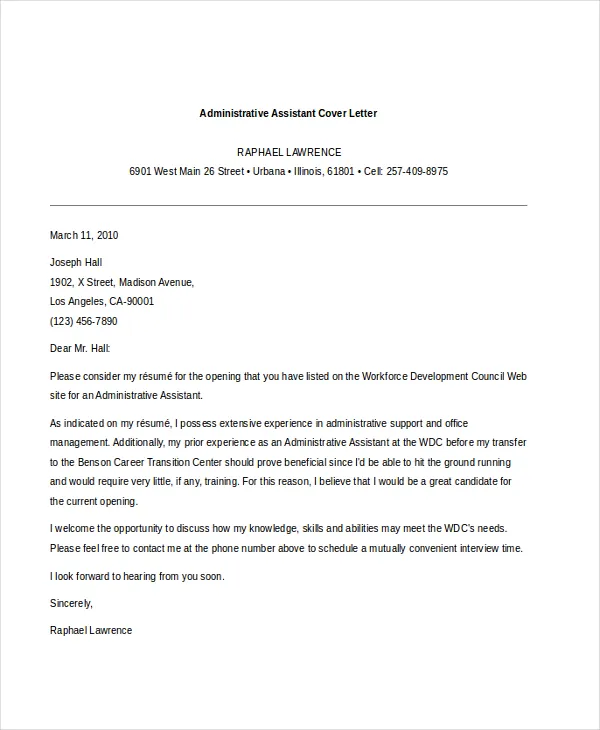Why You Need a Stellar Admin Assistant Cover Letter
In the competitive world of administrative assistant positions, a well-crafted cover letter can be your secret weapon. It’s your first chance to make a positive impression on a potential employer and can significantly increase your chances of landing an interview. While your resume provides a summary of your skills and experience, your cover letter allows you to delve deeper, showcasing your personality, enthusiasm, and the specific value you can bring to the role. A compelling cover letter isn’t just a formality; it’s an opportunity to differentiate yourself from other applicants and demonstrate why you are the ideal candidate for the job. A strong cover letter acts as a gateway, inviting the hiring manager to learn more about you.
Key Elements of an Effective Cover Letter
A successful cover letter for an administrative assistant position contains several key elements. Each component plays a crucial role in presenting you as a polished and capable professional. By carefully crafting each section, you can create a cover letter that is both informative and engaging, leaving a lasting positive impression on the hiring manager. Remember, the goal is to make the reader want to learn more about you and see you as a potential asset to their team. Let’s break down the essential elements of a standout cover letter.
Your Contact Information
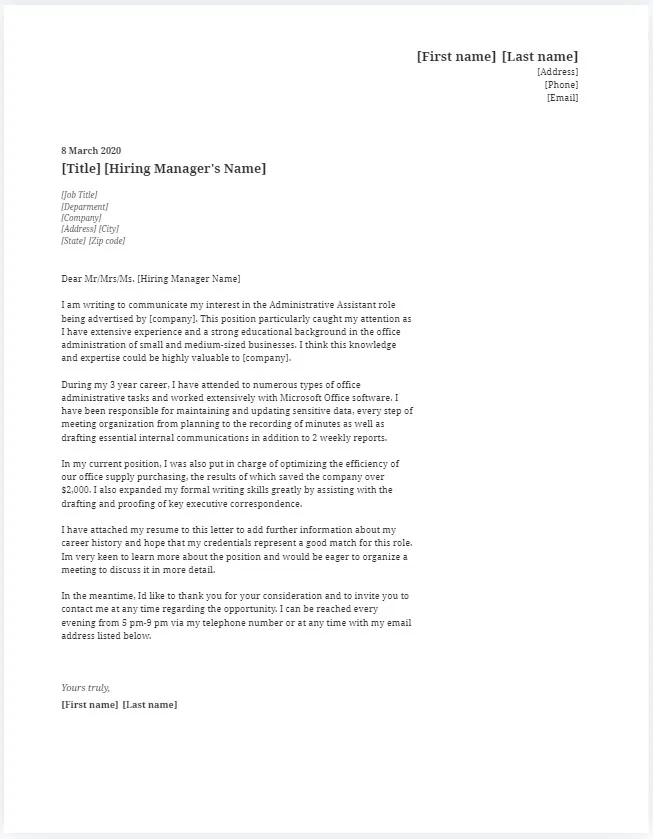
Start your cover letter by including your full name, address, phone number, and professional email address. This information should be clearly displayed at the top of the letter. Ensure your email address is professional and appropriate. This allows the hiring manager to easily contact you if they are interested in your qualifications.
The Hiring Manager’s Name
Always address your cover letter to a specific person if possible. Research the company to find the name of the hiring manager or the person in charge of the administrative assistant position. Addressing the letter to a specific individual shows that you have taken the time to research the company and are genuinely interested in the opportunity. If you can’t find a specific name, using a title like “Hiring Manager” is acceptable.
A Compelling Opening
Your opening paragraph should immediately grab the reader’s attention. Briefly state the position you are applying for and how you learned about it. Then, concisely highlight your most relevant skills and experience, emphasizing what makes you a strong candidate. Show enthusiasm and a genuine interest in the company and the role. The goal is to make the reader want to continue reading and learn more about you. An engaging opening sets the tone for the rest of the letter and increases the likelihood of a positive response. Focus on key achievements or qualities that directly relate to the job description.
Highlighting Your Skills and Experience
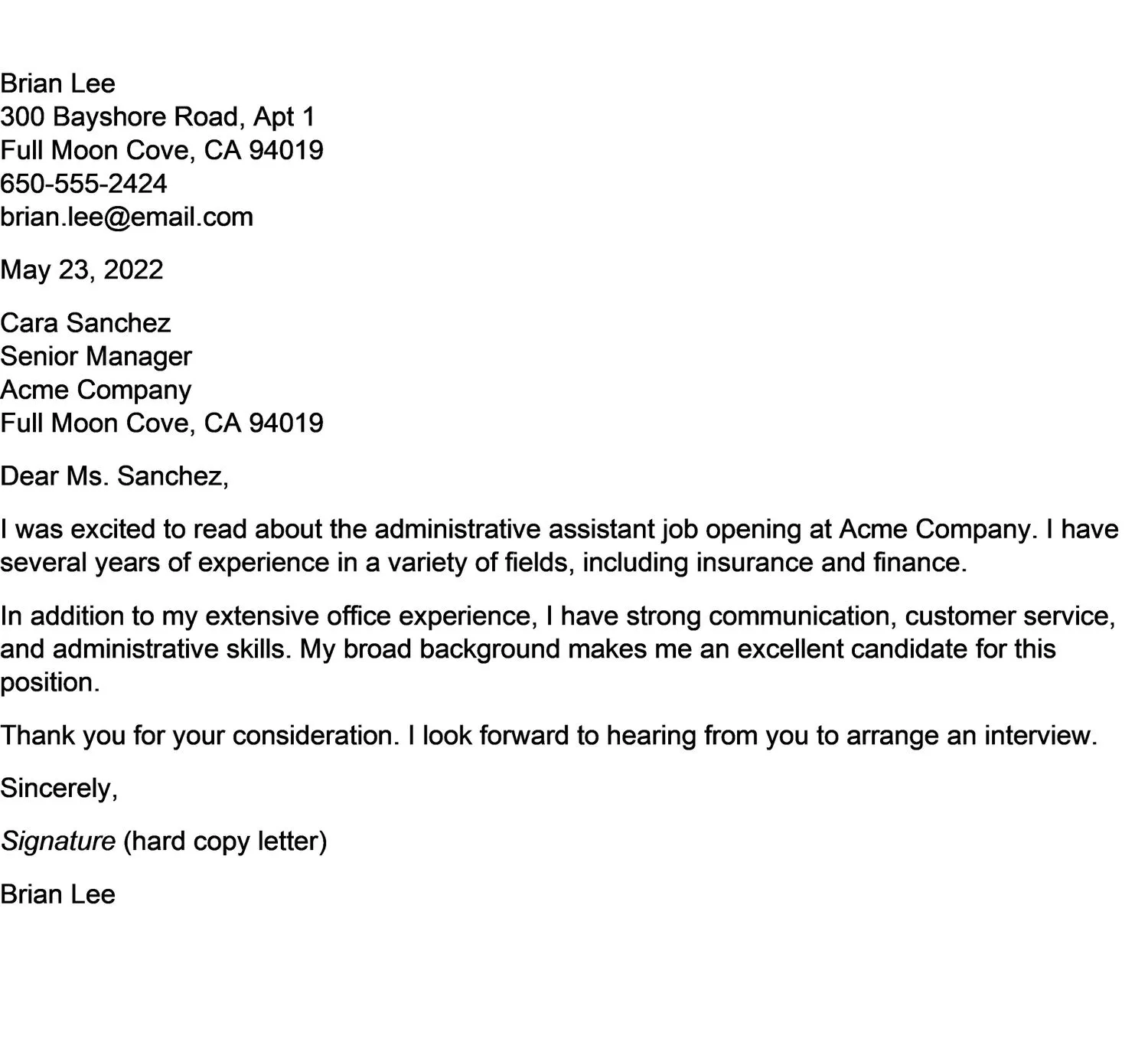
The body of your cover letter is where you highlight your skills and experience, demonstrating how they align with the job requirements. This section should be tailored to the specific position, emphasizing the skills and experience most relevant to the role. Use this opportunity to showcase your abilities and achievements, illustrating how you have previously contributed to the success of other organizations. Focus on the skills and experiences that directly align with the job description to demonstrate your suitability.
Administrative Skills to Showcase
Administrative assistants require a diverse skill set. In your cover letter, highlight skills such as organization, time management, attention to detail, and proficiency in office software (e.g., Microsoft Office Suite, Google Workspace). Mention your experience with scheduling, managing calendars, handling correspondence, and preparing reports. Providing examples of how you have successfully utilized these skills in previous roles will strengthen your application. Emphasize your ability to handle multiple tasks simultaneously and prioritize effectively.
Communication and Interpersonal Skills
Strong communication and interpersonal skills are essential for administrative assistants. Highlight your ability to communicate clearly and professionally, both verbally and in writing. Showcase your experience in managing phone calls, greeting visitors, and interacting with colleagues and clients. Mention your ability to maintain confidentiality and handle sensitive information with discretion. These skills are critical to fostering positive working relationships and representing the company in a professional manner. Emphasize your ability to work collaboratively and adapt to different communication styles.
Technical Skills
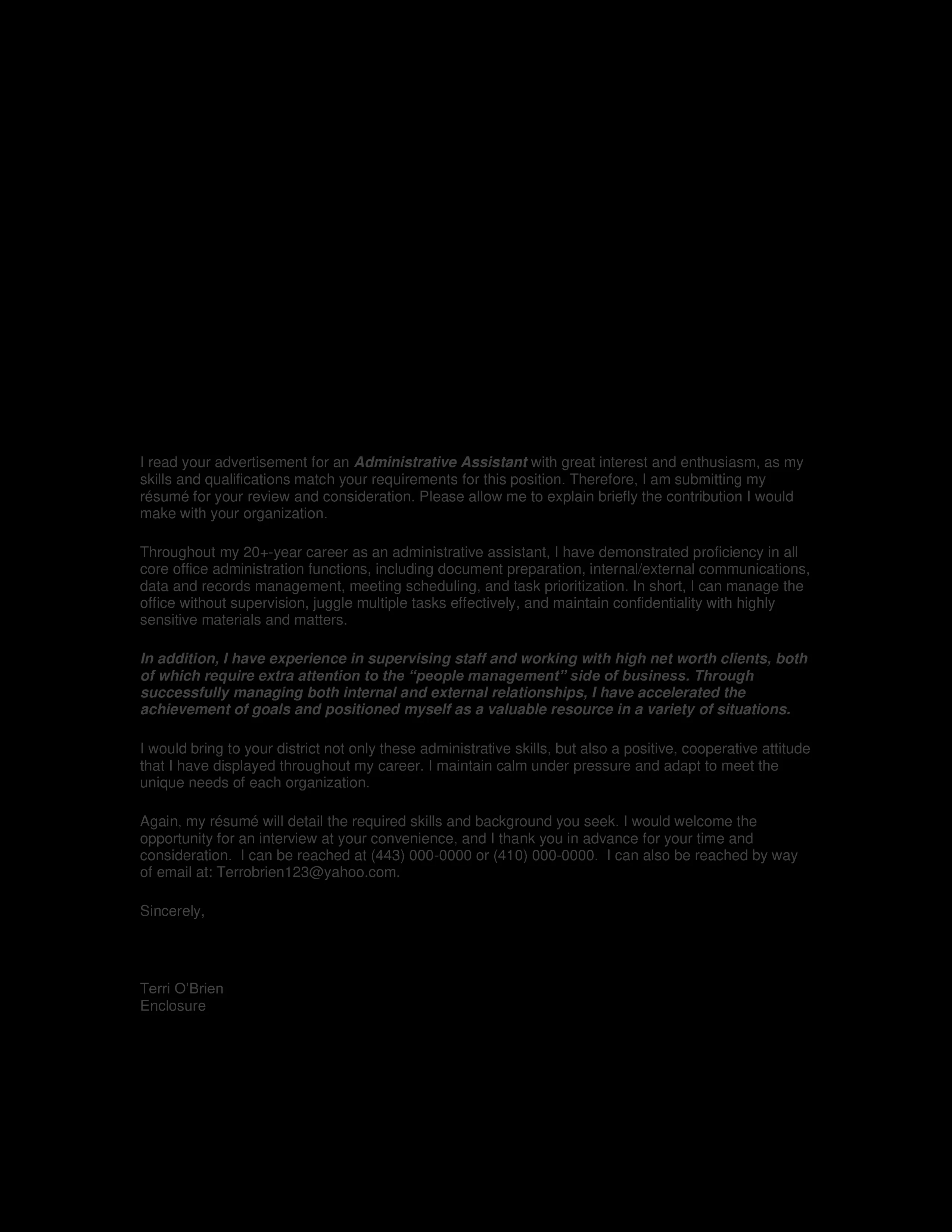
Proficiency in relevant software and technology is a must-have for administrative assistant roles. Include a list of the software you are familiar with, such as word processing, spreadsheets, presentation software, and database management tools. Mention your experience with any industry-specific software or systems. Specify your typing speed and any experience with virtual meeting platforms. Technical skills are critical for efficiency and productivity in the modern workplace. Tailor your skills list to match the requirements outlined in the job description.
Quantifying Your Achievements
Instead of just listing your responsibilities, quantify your achievements to demonstrate your impact. Use numbers and data to showcase your accomplishments. This could include metrics like the number of projects managed, the percentage of efficiency improvements, or the amount of money saved through cost-cutting measures. Quantifying your achievements provides concrete evidence of your capabilities and makes your cover letter more compelling. Highlighting your accomplishments with measurable results showcases your value to the potential employer and sets you apart from other applicants.
Providing Specific Examples
Support your claims with specific examples from your previous roles. Describe situations where you demonstrated your skills and how you achieved positive outcomes. Instead of saying, “I improved office organization,” provide details such as “Implemented a new filing system that reduced document retrieval time by 30%.” Provide context for each example, explaining the challenge, the actions you took, and the results. Providing specific examples adds credibility to your claims and helps the hiring manager understand how you would perform in their organization. Concrete examples give hiring managers a clear picture of your capabilities.
Using Action Verbs
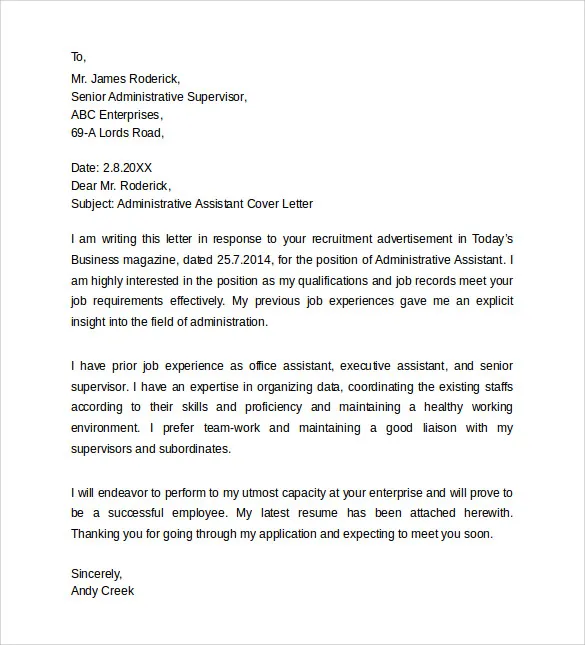
Use strong action verbs to describe your accomplishments and responsibilities. Action verbs bring your cover letter to life and make it more engaging. Examples include “managed,” “coordinated,” “implemented,” “streamlined,” “organized,” “developed,” and “achieved.” Action verbs make your accomplishments more impactful and highlight your proactive approach. Using a variety of action verbs can also help you avoid repetition and keep your letter concise and easy to read. Action verbs are essential for conveying confidence and showcasing your abilities.
Expressing Enthusiasm and Closing
In your closing paragraph, reiterate your interest in the position and the company. Express your enthusiasm for the opportunity and your belief that you would be a valuable asset. Thank the hiring manager for their time and consideration. Include a call to action, such as stating that you are eager to discuss your qualifications further in an interview. A strong closing leaves the reader with a positive impression and encourages them to take the next step. Make it clear why you are excited about the specific role and the company’s mission.
Professional Closing and Signature
End your cover letter with a professional closing such as “Sincerely,” “Best regards,” or “Thank you.” Type your full name below the closing. If submitting a printed copy, leave space for your signature above your typed name. Your signature adds a personal touch and reinforces your professionalism. Ensure your closing is consistent with the tone of your letter. A professional closing makes a positive final impression.
Proofreading and Formatting
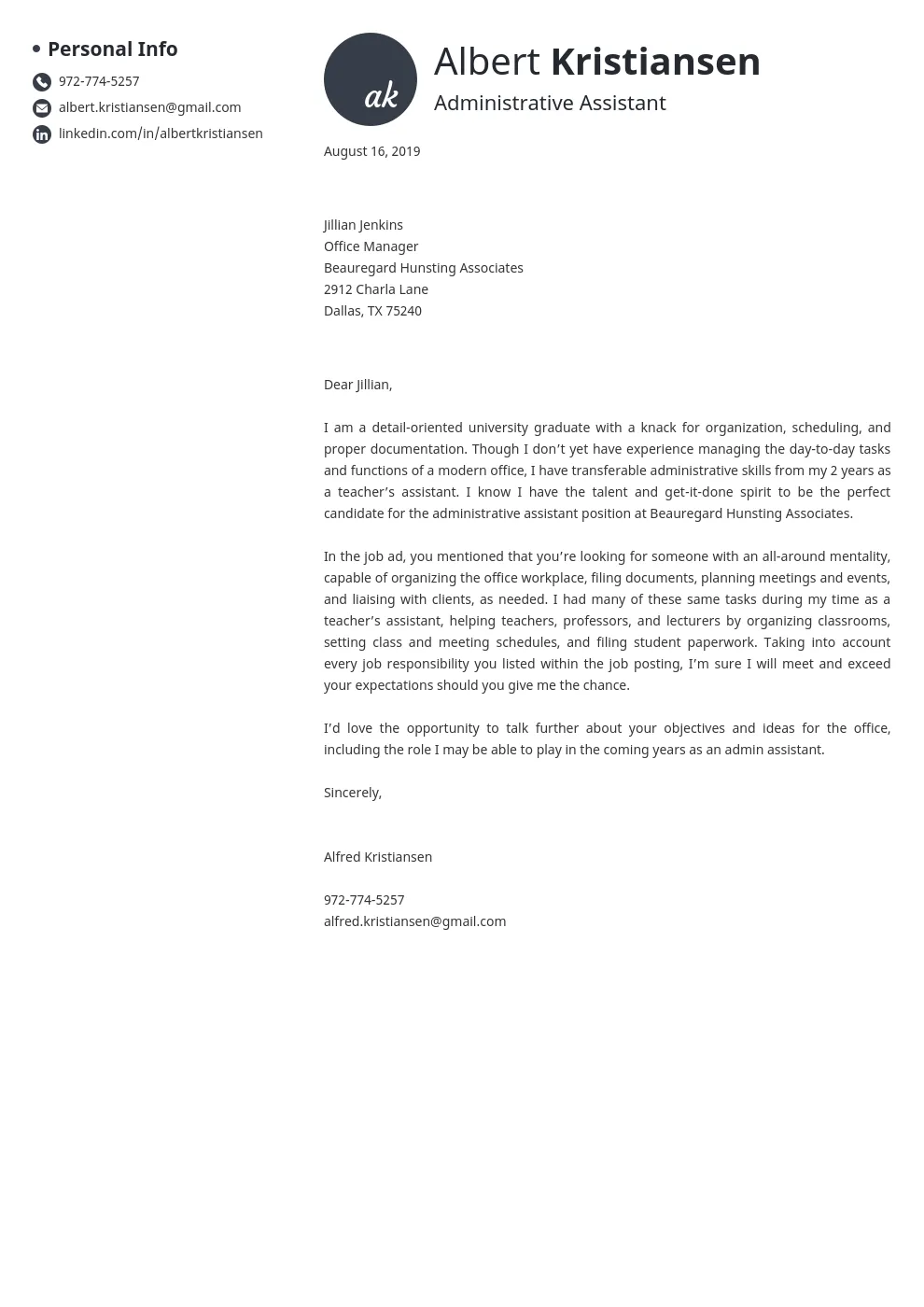
Before submitting your cover letter, carefully proofread it for any errors in grammar, spelling, and punctuation. Ensure your formatting is consistent and professional. Use a standard font, such as Times New Roman or Arial, and maintain consistent margins and spacing. A well-formatted and error-free cover letter demonstrates attention to detail and professionalism. Proofreading is a critical step in ensuring your letter is polished and presents you in the best possible light. Have someone else review your cover letter to catch any errors you may have missed.
